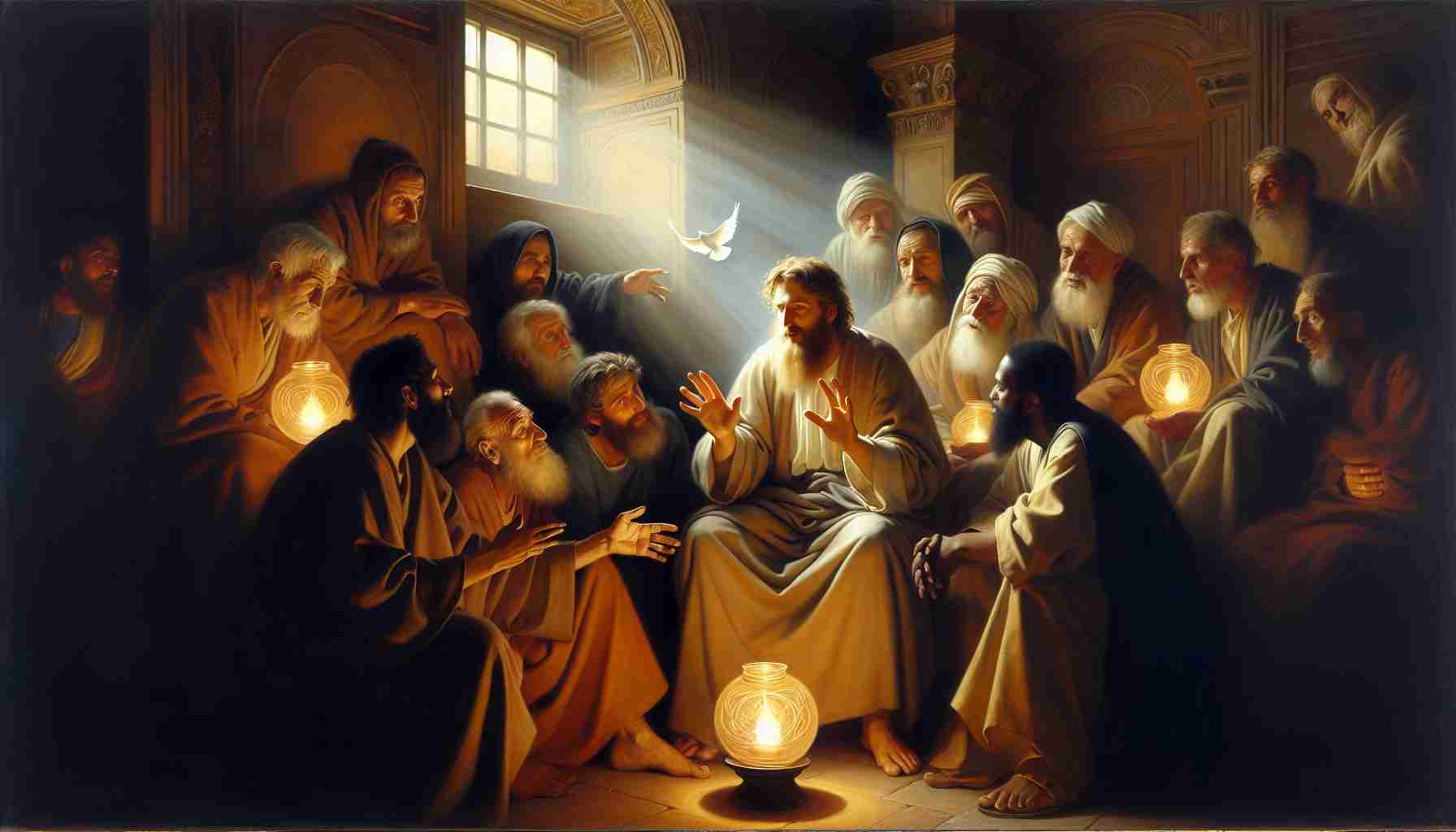

The market road smelled of figs, sweat, and dust. Roman soldiers walked its edges with bored stares and full swords, their leather sandals thudding against stone. It was the fourth day since the Teacher had been taken, and even the sun seemed quieter over Jerusalem. Yacov stayed in the shadows behind a vendor’s awning, his tunic damp with nerves. He had run when they came for Jesus. Not once. Twice. Three times, he said, “I’m not with Him.” Now every heartbeat came with shame.
Around him, the city pulsed with Passover’s aftermath—pilgrims packing, merchants shouting, children laughing. It felt immoral, somehow, that the world hadn’t stopped to grieve what he had abandoned. He clutched the small piece of linen he’d used to wipe oil from Jesus’ feet that night at Bethany—the only thing he had left that hadn’t turned its back on Him.
He couldn’t go back to the others. Not yet. They’d seen him swear, curse even, to avoid being arrested. He couldn’t forgive himself. How could they?
A woman passed, whispering to her companion that she’d heard the Teacher’s body was missing. That His tomb was empty.
Yacov turned his head. “What did you say?”
But the women were already gone.
He didn’t believe in ghost stories, but his legs were already moving. Moving toward the upper room—where they had shared bread, and Jesus had said things that at the time felt like riddles. “If I go, I will send you a Helper,” He had said, voice low and final. “I will not leave you as orphans.”
Yacov hadn’t understood it then. He hadn’t believed any of it. He had been too proud. Too afraid.
Inside the house, the others were there, some standing, some pacing. Peter looked like a man with a rope around his heart. A door creaked open. And there—Jesus stood.
No one moved. Yacov’s breath was caught somewhere behind his ribs. He looked at Jesus’ hands. The wounds were still fresh, still wide and red.
“Peace I leave with you,” Jesus said, speaking into the thick silence. “My peace I give to you. Not as the world gives.”
No rebuke. No condemnation. Only peace.
Jesus turned to Yacov. Their eyes met, and Yacov’s throat tightened. He opened his mouth to confess it all—the betrayal, the fear, the shame clawing at his gut—but Jesus simply nodded, as if to say, I know.
Then something like breath passed through the room. Not air, not wind—life. Warm. Whole. It wrapped around Yacov’s soul and stilled the shaking in his limbs.
“I will send you the Helper,” Jesus said, then was gone.
As silence returned, Yacov touched his chest, stunned at the stillness there. The weight was gone.
He turned to Peter, voice thick but steady. “I think…I think He meant it. About not leaving us.”
And then he fell to his knees—not in sorrow, but in awe—and whispered for the first time with belief, “You’re really sending Him, aren’t You?”
The market road smelled of figs, sweat, and dust. Roman soldiers walked its edges with bored stares and full swords, their leather sandals thudding against stone. It was the fourth day since the Teacher had been taken, and even the sun seemed quieter over Jerusalem. Yacov stayed in the shadows behind a vendor’s awning, his tunic damp with nerves. He had run when they came for Jesus. Not once. Twice. Three times, he said, “I’m not with Him.” Now every heartbeat came with shame.
Around him, the city pulsed with Passover’s aftermath—pilgrims packing, merchants shouting, children laughing. It felt immoral, somehow, that the world hadn’t stopped to grieve what he had abandoned. He clutched the small piece of linen he’d used to wipe oil from Jesus’ feet that night at Bethany—the only thing he had left that hadn’t turned its back on Him.
He couldn’t go back to the others. Not yet. They’d seen him swear, curse even, to avoid being arrested. He couldn’t forgive himself. How could they?
A woman passed, whispering to her companion that she’d heard the Teacher’s body was missing. That His tomb was empty.
Yacov turned his head. “What did you say?”
But the women were already gone.
He didn’t believe in ghost stories, but his legs were already moving. Moving toward the upper room—where they had shared bread, and Jesus had said things that at the time felt like riddles. “If I go, I will send you a Helper,” He had said, voice low and final. “I will not leave you as orphans.”
Yacov hadn’t understood it then. He hadn’t believed any of it. He had been too proud. Too afraid.
Inside the house, the others were there, some standing, some pacing. Peter looked like a man with a rope around his heart. A door creaked open. And there—Jesus stood.
No one moved. Yacov’s breath was caught somewhere behind his ribs. He looked at Jesus’ hands. The wounds were still fresh, still wide and red.
“Peace I leave with you,” Jesus said, speaking into the thick silence. “My peace I give to you. Not as the world gives.”
No rebuke. No condemnation. Only peace.
Jesus turned to Yacov. Their eyes met, and Yacov’s throat tightened. He opened his mouth to confess it all—the betrayal, the fear, the shame clawing at his gut—but Jesus simply nodded, as if to say, I know.
Then something like breath passed through the room. Not air, not wind—life. Warm. Whole. It wrapped around Yacov’s soul and stilled the shaking in his limbs.
“I will send you the Helper,” Jesus said, then was gone.
As silence returned, Yacov touched his chest, stunned at the stillness there. The weight was gone.
He turned to Peter, voice thick but steady. “I think…I think He meant it. About not leaving us.”
And then he fell to his knees—not in sorrow, but in awe—and whispered for the first time with belief, “You’re really sending Him, aren’t You?”